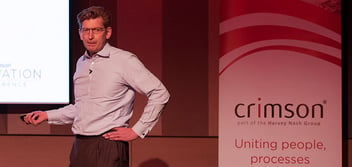The five foundations of successful IT project management
IT project management is not a skill, it’s an art form. It’s a balancing act that requires systematic organised delivery, emotional intelligence, and technical prowess.
As an IT consultancy, Crimson, over the last 15+ years, has honed this craft and it has decided to share its top project management tips with you.
Through this article you can discover Crimson’s five foundations of successful project management as compiled by one of its IT project managers.
The five foundations of successful IT project management
1, The Project:
Within the project all the following elements need to be in place:
- A defined delivery team.
- A roadmap for completion, including project milestones.
- An integrated approach to achieving project and business objectives.
- A plan for stakeholder engagement.
- An established IT Project Manager that will be responsible for implementing the project.
2, Attitude:
Attitude is a little thing but it makes a big difference. All the members of the delivery team must have a ‘will make every effort to do’ attitude throughout the project, as this will ensure all tasks are completed. They must be prepared to move out of their comfort zone, for example, they may have to sit on the service desk occasionally (if it is understaffed). They must also be fully engaged in the task they’re working on whilst being mindful of the project’s wider goals.
3, Communication:
The IT Project Manager must have the willingness to engage every level of stakeholder both internally and externally. Good communication underpins effective customer service, so the project manager must be the conduit between technical and commercial teams engaging stakeholders patiently at their level. Despite this, there should be a ‘no rule’ for customer interaction, with defined levels of communications for different timeslots throughout the 24hour day, (IT project managers need sleep too).
4, Process (Agile):
Project methodologies must be established before implementation begins as they are proven in terms of organising work output.
Agile is a key driver in successful software development and then the deployment of the software into a commercial environment. It should not be a purely technical endeavour. The IT project manager must act as the owner, involved-in and contributing to the progress of this process. This is critical as delays, poor organisation, or low quality execution will have an impact on the client’s budget and the IT solutions provider’s profit margin.
5, Customer focus:
Effective customer service is the goal for every IT project. It is not a by-product, it is the number one priority. As George Boulden says: “hard work on a project counts for little if the customer (or stakeholder) feels neglected, ignored or disrespected.” Reports suggest that a customer is four times more likely to defect to a competitor if a service-related issue is not managed effectively, rather than price or technology issues. The IT Project Manager must anticipate the stakeholders’ needs, demonstrate that they are solving any issues that occur, and build trust to ensure the stakeholders feel they are getting value for their investment.
Bringing it all together
Successful project management is built on a focused delivery team with business acumen, strong defined processes, good communication, and a ‘customers’ first’ approach.
If you would like to find out more about Crimson’s IT solutions services click here.
Crimson is an IT consultancy, an IT solutions provider, an IT recruitment agency, and a Microsoft Gold Partner operating across the UK.


